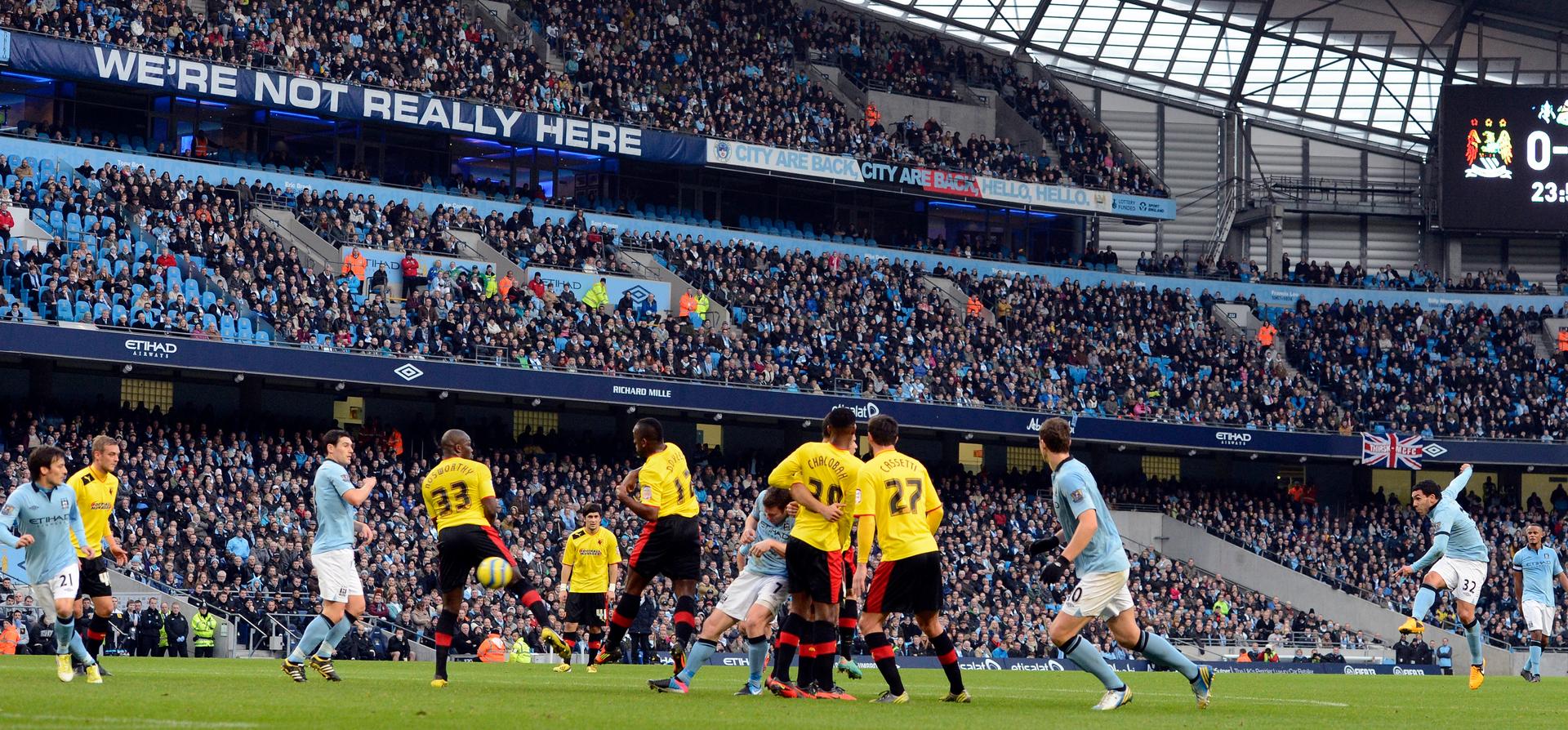Argentina curbs trade in ‘soccer slaves’
Manchester City’s Argentine striker, Carlos Tevez, (R) scores from a free kick during the English FA Cup third round soccer match between Manchester City and Watford at The Etihad stadium in Manchester, England on Jan. 5.
LIMA, Peru — From Diego Maradona to Lionel Messi, Argentina’s assembly line of soccer talent is legendary.
The lucrative industry has seen the South American nation exporting pros to clubs of all levels around the world, from minor national league teams in Albania and Vietnam to current English and Spanish champions Manchester City and Real Madrid.
But now, Argentina’s taxman is taking aim at the seamier side of the industry — shadowy businessmen seeking to make a fast buck out of young players while dodging taxes in secretive deals.
Third-party ownership, as it's called, sees investors unconnected to soccer clubs buying stakes in promising pros, in hopes of picking up a share of multimillion dollar transfer fees if the youngsters make good.
The practice is routine in South America — particularly Argentina and Brazil, the world’s top two exporters of players — but frowned on in Europe and the US-based Major League Soccer (MLS).
Gordon Taylor, who heads the Professional Footballers' Association in the UK, where third-party ownership is banned, has described it as “trading in human beings” and warned it harms the sport.
Argentina’s tax authority, AFIP, agrees.
This month, the agency unveiled a series of measures aimed at curbing the practice — without banning it outright — and putting an end to the tax-dodging and corruption that have come hand in glove with it.
One common ploy is to transfer Argentine players to small clubs in neighboring Chile or Uruguay, which have lower tax rates, before selling them on elsewhere.
In most cases, the players never even set foot in those other South American countries — never mind playing a game — before being moved on to their new clubs in Europe or Asia.
The measures enacted by the AFIP include new compulsory registers for both soccer agents and investors in players, and a new requirement for each club to establish a single bank account where all transfer fees are deposited.
AFIP is also giving itself the power to establish a nominal value for a player in cases where it suspects a transfer price was manipulated to avoid taxes.
And just in case there was any risk of Argentine soccer’s wheeler-dealers not taking the new rules seriously, AFIP will tax registered agents and investors at 17.5 percent and their unregistered counterparts at 90 percent.
It also warned that it will annul the tax registration of anyone involved in under-the-table player deals, effectively barring that person from doing legal business in Argentina.
More from GlobalPost: After death, Peru targets soccer hooligans
The move was welcomed by Ariel Greco, sports editor of Argentine paper Pagina12, who told GlobalPost that third-party ownership frequently results in violations of players’ labor rights.
“I am not sure you can call it slavery but there are players, including at big clubs, who are being pressured into career decisions they might not want to make, especially the younger players,” he said.
“They can often be given a house or a car, which does not cost much compared to what some players earn, and encouraged to accept what is being effectively forced onto them. There are players who have not chosen to play where they are playing.”
The slavery angle is unlikely to wash in England, where third-party ownership first hit the headlines when superstar Argentine forward Carlos Tevez controversially signed for London club West Ham.
West Ham still owes millions of dollars as a result of the scandal, after being sued by a rival club for fielding a player who, under English laws, was not eligible to play.
Tevez — brought up in a Buenos Aires slum — managed to put that brouhaha in the shade at his current club, Manchester City.
Widely reported to be earning about $300,000 a week, Tevez feuded with the club in 2011 after refusing to play — apparently out of anger at being a substitute rather than a starter.
Yet most Argentine pros, especially those in lower leagues, earn just a fraction of Tevez’s astronomic wage.
And, unlike him, they are not multimillion dollar assets who can fling their weight around even at the largest clubs.
Meanwhile, according to Greco, Argentina’s pro soccer players’ union, the FAA, is too “comfortable” with the clubs and soccer establishment to challenge the system.
The FAA did not respond to GlobalPost’s repeated requests, by phone and email, for comment.
But it is not just AFIP that has third-party ownership in its sights. In December, European soccer’s governing body, UEFA, called for a global ban on the practice.
UEFA also suggested that it would prohibit third-party ownership in Europe if FIFA, world soccer’s governing body, did not move first.
In the United States, the MLS has already done so.
In a short but unequivocal email to GlobalPost, Lino DiCuollo, MLS vice president of player relations, wrote: “MLS and our clubs do not engage in deals that involve third-party owners. We only transact deals with clubs that are officially sanctioned and affiliated with FIFA.”
On the field, the MLS still has a long way to go to reach the standards set by the Argentine game.
Off it, however, "futbol" in the South American country may just have taken its first step toward catching up with modern, transparent ways of doing business now prevalent in US and British soccer.
Every day, reporters and producers at The World are hard at work bringing you human-centered news from across the globe. But we can’t do it without you. We need your support to ensure we can continue this work for another year.
Make a gift today, and you’ll help us unlock a matching gift of $67,000!
